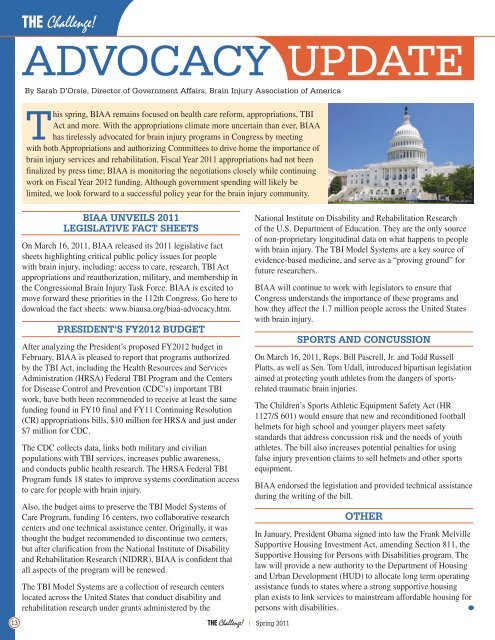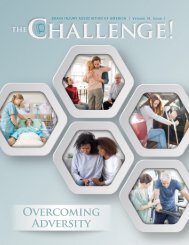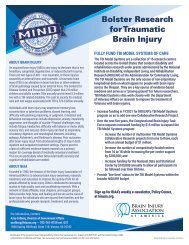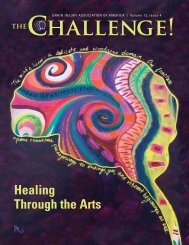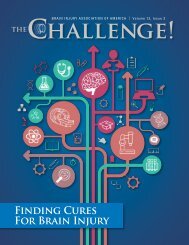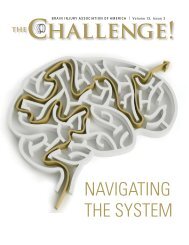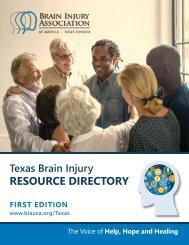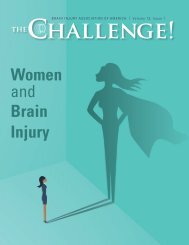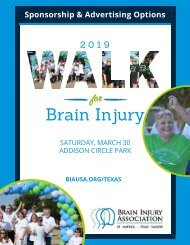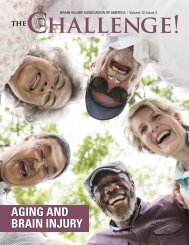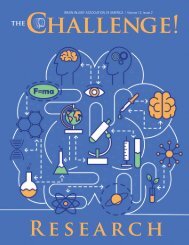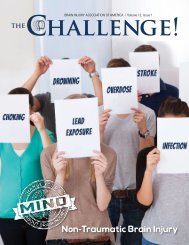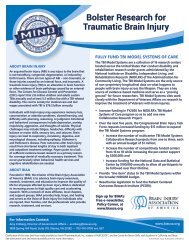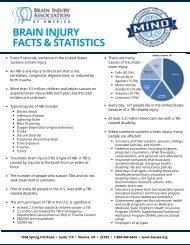THE Challenge! Spring 2011
Communication
Communication
Create successful ePaper yourself
Turn your PDF publications into a flip-book with our unique Google optimized e-Paper software.
<strong>THE</strong> <strong>Challenge</strong>!<br />
ADVOCACY UPDATE<br />
By Sarah D’Orsie, Director of Government Affairs, Brain Injury Association of America<br />
This spring, BIAA remains focused on health care reform, appropriations, TBI<br />
Act and more. With the appropriations climate more uncertain than ever, BIAA<br />
has tirelessly advocated for brain injury programs in Congress by meeting<br />
with both Appropriations and authorizing Committees to drive home the importance of<br />
brain injury services and rehabilitation. Fiscal Year <strong>2011</strong> appropriations had not been<br />
finalized by press time; BIAA is monitoring the negotiations closely while continuing<br />
work on Fiscal Year 2012 funding. Although government spending will likely be<br />
limited, we look forward to a successful policy year for the brain injury community.<br />
BIAA Unveils <strong>2011</strong><br />
Legislative Fact Sheets<br />
On March 16, <strong>2011</strong>, BIAA released its <strong>2011</strong> legislative fact<br />
sheets highlighting critical public policy issues for people<br />
with brain injury, including: access to care, research, TBI Act<br />
appropriations and reauthorization, military, and membership in<br />
the Congressional Brain Injury Task Force. BIAA is excited to<br />
move forward these priorities in the 112th Congress. Go here to<br />
download the fact sheets: www.biausa.org/biaa-advocacy.htm.<br />
President’s FY2012 Budget<br />
After analyzing the President’s proposed FY2012 budget in<br />
February, BIAA is pleased to report that programs authorized<br />
by the TBI Act, including the Health Resources and Services<br />
Administration (HRSA) Federal TBI Program and the Centers<br />
for Disease Control and Prevention (CDC’s) important TBI<br />
work, have both been recommended to receive at least the same<br />
funding found in FY10 final and FY11 Continuing Resolution<br />
(CR) appropriations bills, $10 million for HRSA and just under<br />
$7 million for CDC.<br />
The CDC collects data, links both military and civilian<br />
populations with TBI services, increases public awareness,<br />
and conducts public health research. The HRSA Federal TBI<br />
Program funds 18 states to improve systems coordination access<br />
to care for people with brain injury.<br />
Also, the budget aims to preserve the TBI Model Systems of<br />
Care Program, funding 16 centers, two collaborative research<br />
centers and one technical assistance center. Originally, it was<br />
thought the budget recommended to discontinue two centers,<br />
but after clarification from the National Institute of Disability<br />
and Rehabilitation Research (NIDRR), BIAA is confident that<br />
all aspects of the program will be renewed.<br />
The TBI Model Systems are a collection of research centers<br />
located across the United States that conduct disability and<br />
rehabilitation research under grants administered by the<br />
National Institute on Disability and Rehabilitation Research<br />
of the U.S. Department of Education. They are the only source<br />
of non-proprietary longitudinal data on what happens to people<br />
with brain injury. The TBI Model Systems are a key source of<br />
evidence-based medicine, and serve as a “proving ground” for<br />
future researchers.<br />
BIAA will continue to work with legislators to ensure that<br />
Congress understands the importance of these programs and<br />
how they affect the 1.7 million people across the United States<br />
with brain injury.<br />
Sports and Concussion<br />
On March 16, <strong>2011</strong>, Reps. Bill Pascrell, Jr. and Todd Russell<br />
Platts, as well as Sen. Tom Udall, introduced bipartisan legislation<br />
aimed at protecting youth athletes from the dangers of sportsrelated<br />
traumatic brain injuries.<br />
The Children’s Sports Athletic Equipment Safety Act (HR<br />
1127/S 601) would ensure that new and reconditioned football<br />
helmets for high school and younger players meet safety<br />
standards that address concussion risk and the needs of youth<br />
athletes. The bill also increases potential penalties for using<br />
false injury prevention claims to sell helmets and other sports<br />
equipment.<br />
BIAA endorsed the legislation and provided technical assistance<br />
during the writing of the bill.<br />
Other<br />
In January, President Obama signed into law the Frank Melville<br />
Supportive Housing Investment Act, amending Section 811, the<br />
Supportive Housing for Persons with Disabilities program. The<br />
law will provide a new authority to the Department of Housing<br />
and Urban Development (HUD) to allocate long term operating<br />
assistance funds to states where a strong supportive housing<br />
plan exists to link services to mainstream affordable housing for<br />
persons with disabilities.<br />
13<br />
<strong>THE</strong> <strong>Challenge</strong>! | <strong>Spring</strong> <strong>2011</strong>


